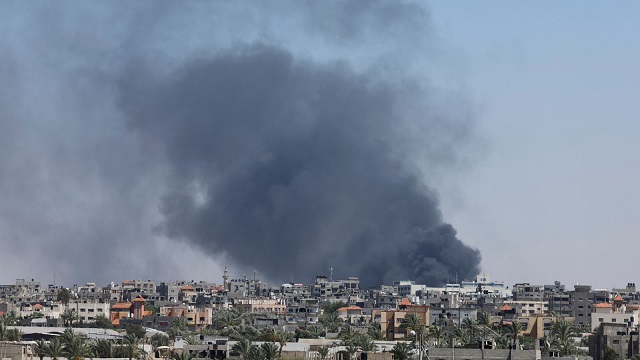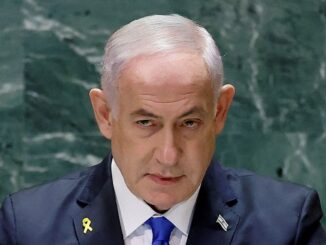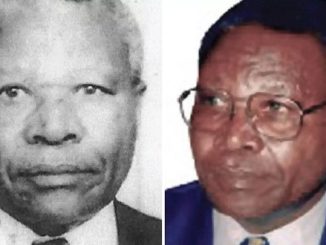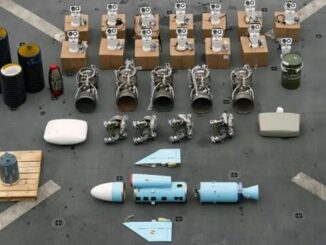
The International Court of Justice (ICJ) has ordered Israel to stop its military offensive in the southern Gaza city of Rafah.
The top United Nations court said the humanitarian situation in Rafah had “deteriorated further” since its previous order for Israel to improve it, adding that what was happening in the besieged Palestinian territory was “disastrous”.
It comes after South Africa put in an emergency request to the ICJ for it to order Israel to stop its Rafah assault.
The ICJ president Nawaf Salam said in The Hague: “The state of Israel shall… immediately halt its military offensive, and any other action in the Rafah governorate, which may inflict on the Palestinian group in Gaza conditions of life that could bring about its physical destruction in whole or in part.”
The court also ordered Israel to open the Rafah crossing between Egypt and Gaza to allow in humanitarian aid, and said Israel must provide access to the territory for investigators and report back on its progress within a month.
The order was handed down a week after it was requested by South Africa, which in January formally accused Israel of committing genocide against Palestinians in a hearing at the UN court.
Israel, which claims its military operations in Gaza are in self-defence and targeted at Hamas fighters, has vehemently denied the accusations, with the office of Prime Minister Benjamin Netanyahu calling them “false, outrageous and disgusting”.
It insisted its Rafah campaign will not “lead to the destruction of the Palestinian civilian population”, adding it would continue to allow aid to enter Gaza “in accordance with the law”.
Israel launched its assault on Rafah this month, forcing hundreds of thousands of Palestinians to flee a city that had become a refuge to around half of the population’s 2.3 million people.
The ICJ is the highest UN body for hearing disputes between states, and its rulings are final and binding but have been ignored in the past.
No enforcement powers
The court has no enforcement powers and Israel has signalled it will not comply with the latest ICJ order, which was adopted by a panel of 15 judges from around the world in a 13-2 vote, opposed only by judges from Uganda and Israel.
In response to the judgment, Israeli finance minister Bezalel Smotrich said: “Those who demand that the State of Israel stop the war, demand that it decree itself to cease to exist. We will not agree to that. If we lay down our weapons, the enemy will reach the beds of our children and women throughout the country.”
South Africa has welcomed the latest ruling, with Zane Dangor, director general of the Department of International Relations and Cooperation, saying the order was “ground-breaking as it is the first time that explicit mention is made for Israel to halt its military action in any area of Gaza”.
Hamas also welcomed the ruling but said it was insufficient, with senior official Basem Naim saying “we believe it is not enough since the occupation aggression across the Gaza Strip and especially in northern Gaza is just as brutal and dangerous”.
“We call upon the UN Security Council to immediately implement this demand by the World Court into practical measures to compel the Zionist enemy to implement the decision.”
Israel says it has no choice but to attack Rafah to root out the last battalions of Hamas fighters it says are hiding there.
‘We’re doing this in a targeted and precise way’
Mr Netanyahu has vowed to both eliminate Hamas and get all the hostages back who were taken in the 7 October attacks.
“Hamas is in Rafah, Hamas has been holding our hostages in Rafah, which is why our forces are manoeuvring in Rafah. We’re doing this in a targeted and precise way,” Israeli chief military spokesperson Rear Admiral Daniel Hagari said on Thursday.
But the US – Israel’s most powerful ally – has threatened to scale back its support over the deteriorating humanitarian situation in Gaza.
What were the earlier ICJ rulings?
In a previous ruling in January, the court ordered Israel to prevent any acts of genocide against the Palestinians, while stopping short of ordering a halt to the military offensive.
And in a second order in March, the court said Israel must take measures to improve the humanitarian situation.
Also in January, the ICJ called on Hamas to release hostages it captured on 7 October.
The chief prosecutor of the International Criminal Court – a separate court also based in The Hague – announced on Monday he had filed an application for arrest warrants against Mr Netanyahu and defence minister Yoav Gallant, as well as leaders of Hamas.
Prosecutor Karim Khan accused Mr Netanyahu and Mr Gallant of crimes including extermination, using hunger as a weapon and deliberately attacking civilians. Israel strongly denied the charges.
The Israelis said Hamas killed 1,200 people and took more than 250 hostages in the 7 October raid on southern Israel.
Since then, Israel’s incursion has killed more than 35,000 people, according to the Hamas-run health ministry in Gaza.
THE RULING WILL LIKELY NOW GO TO THE UN SECURITY COUNCIL
Alistair Bunkall Middle East correspondent @AliBunkallSKY
Once again, Israel finds itself on the wrong side of international law and is becoming rapidly isolated in the world as it pursues the elimination of Hamas inside Gaza.
This week, the chief prosecutor for the International Criminal Court requested arrest warrants against Benjamin Netanyahu and Yoav Gallant, three European states announced they would formally recognise a Palestinian state and now the International Court of Justice has ruled it must immediately end its operations in Rafah.
The difference between the ICC and ICJ is that the former deals with individuals and the latter nation states.
The ICJ has no power to enforce its rulings and Israeli officials have already definitely said they will ignore it.
Doing so, however, risks Netanyahu being accused of acting no differently to Vladimir Putin who refused to stop Russia’s invasion of Ukraine despite the court ordering in 2022 that he do so. It could lead to further ostracisation of Israel in the world.
It would also put the White House in a tricky position – having fully supported the ICJ against Russia two years ago, Joe Biden would be accused of hypocrisy and of undermining international law if he rejects the court and chooses to support Israel on this occasion.
The ruling will likely now go to the UN Security Council. Israel will expect America’s support there, but Washington might be persuaded to abstain rather than veto, especially as the ICJ ruling relates to Rafah and not the whole of Gaza.
But if Israel is forced to pull out of Rafah, it will leave Hamas infrastructure and fighting battalions in place – that way, the Israelis will have failed to achieve their objective of destroying Hamas and it will be spun as a defeat for Israel. That is not something Netanyahu will allow.
Source: ![]() news.sky.com
news.sky.com








Be the first to comment